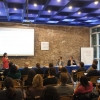 Metropolis Secretariat General
Metropolis Secretariat General
Metropolis Observatory: capitalizing and generating knowledge of metropolitan governance
Last Monday Metropolis launched its new metropolitan observatory, a project that aims to bring together various actors in a space for reflection on the phenomena of transformation that characterize contemporary major cities and the development of metropolitan areas.
With the support of the Metropolitan Area of Barcelona, the Metropolis Observatory aims to provide frameworks for the major cities of the world on the need to incorporate the metropolitan vision into the governance of cities and their surrounding territories. Also, one of the objectives of the observatory is to build a space of communication of the knowledge on the required technical and political tools to face the processes of change within and among metropolitan areas.
The event was held at the Barcelona Centre for International Affairs (CIDOB) under the motto "The challenges of major cities" and focused on the analysis of metropolitan trends in the world, the challenges of metropolitan governance and the different approaches to manage large urban agglomerations.
The session was opened by the Secretary General of Metropolis, Felip Roca, and by the Director of International Relations and Cooperation of the Barcelona Metropolitan Area, Oriol Illa, who emphasized that the Metropolis Observatory was created to offer the association an instrument for analysis, and that global networks such as Metropolis must be able to respond to the needs of cities.
In the first block of the conference, Mariona Tomàs, associate professor of political science at the University of Barcelona and expert in metropolitan governance, presented the first volume of the Issue Papers of the Metropolis Observatory collection, which analyzes the contemporary metropolitan trends and the multiple governance models which are put in practice. Then, Josep Maria Coll, senior associate researcher at CIDOB, presented the concept "Wise cities" as a new paradigm for cities worldwide.
Then, the attendees could participate in the debate of a round table about different approaches of metropolitan governance, which was moderated by Edgardo Bilsky, director of studies in UCLG. In this part of the program, Philippe Rivet and Tito Handal presented their challenges as directors of the metropolitan observatories of the Montreal Metropolitan Community (CMM) and of San Salvador, respectively. The head of Greater Paris, Pierre Mansat, and the manager of the Metropolitan Area of Barcelona, Ramon Torra, presented the specificities of their regions and the different instruments and indicators used in their management.
In the final block of the conference, Verena Goranko, policy adviser at GIZ, presented the tools offered by the German international cooperation agency to achieve the objectives of sustainable development through metropolitan cooperation.
The event was closed by the Vice President of the Metropolitan Area of Barcelona, Alfred Bosch, who congratulated Metropolis and its stakeholders, and underlined the continuity of the AMB's commitment to support this project.

